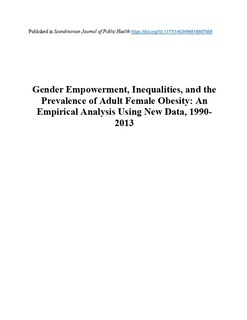| dc.contributor.author | de Soysa, Indra | |
| dc.contributor.author | Lewin, Oda L. | |
| dc.date.accessioned | 2019-05-07T10:56:11Z | |
| dc.date.available | 2019-05-07T10:56:11Z | |
| dc.date.created | 2019-01-28T16:12:41Z | |
| dc.date.issued | 2018 | |
| dc.identifier.issn | 1403-4948 | |
| dc.identifier.uri | http://hdl.handle.net/11250/2596776 | |
| dc.description.abstract | Aims: Do gender inequality and gender discrimination explain female obesity? Discrimination denies access to choose and constrains agency. Scope: Using the Global Burden of Disease data on overweight and obesity share of the adult female population for almost 160 countries over a 24-year period, we find that female empowerment has no effect on the population share that is overweight, but it reduces the obese share of women. The substantive impact is, however, slight and the results are not robust to testing a sample of only developing countries. Political freedoms for women in general, however, show positive effects on the prevalence of obesity, results that are again substantively meagre. Higher levels of income inequality and a measure of health inequality predict lower levels of female obesity independently of the controls, which raises some doubt about large arguments linking generalized inequality to obesogenic environments. Results: In so far as our measures of female empowerment capture greater access to rights and agency, they are poor predictors of the prevalence of obesity. The results suggest that local-level idiosyncrasies matter a lot more than do macro-level factors. Conclusions: Any conclusion should be treated tentatively given the short temporal domain examined here and uncertainties in the data. While promoting rights and equity for women are still intrinsically valuable and moral, the task of reducing obesity per se may require more targeted public action promoting healthier lifestyles and consumption among vulnerable groups. | nb_NO |
| dc.language.iso | eng | nb_NO |
| dc.publisher | SAGE Journals | nb_NO |
| dc.subject | Gender empowerment | nb_NO |
| dc.subject | discrimination | nb_NO |
| dc.subject | obesity | nb_NO |
| dc.subject | income inequality | nb_NO |
| dc.subject | health inequality | nb_NO |
| dc.subject | obesogenic environments | nb_NO |
| dc.title | Gender empowerment, inequalities and the prevalence of adult female obesity: An empirical analysis using new data, 1990–2013 | nb_NO |
| dc.type | Journal article | nb_NO |
| dc.type | Peer reviewed | nb_NO |
| dc.description.version | acceptedVersion | nb_NO |
| dc.source.journal | Scandinavian Journal of Public Health | nb_NO |
| dc.identifier.doi | 10.1177/1403494818807568 | |
| dc.identifier.cristin | 1666780 | |
| dc.description.localcode | © 2018. This is the authors' accepted and refereed manuscript to the article. The final authenticated version is available online at: http://journals.sagepub.com/doi/10.1177/1403494818807568 | nb_NO |
| cristin.unitcode | 194,67,25,0 | |
| cristin.unitname | Institutt for sosiologi og statsvitenskap | |
| cristin.ispublished | true | |
| cristin.fulltext | original | |
| cristin.qualitycode | 1 | |
